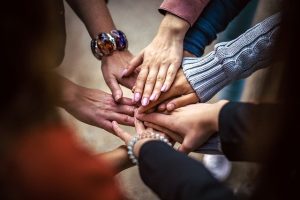One Tribe
My work team and I provide services to patients and the public in our aquatic rehab facility in Central Maine, which means it’s impossible for me to live in a bubble. Thank goodness.
I’ve been complimented, praised, flirted with, yelled at, accused, and blamed. I’ve listened to a wide range of political and religious viewpoints with a polite face on. I’ve dealt with tears and tantrums (not talking only about the kids here). I’ve heard about medical and family history in excruciating detail, often repeatedly. I’ve watched patrons and patients get better, and I’ve watched them get worse. I’ve watched them lose weight and gain weight. I’ve met grandchildren and siblings when they visit Maine. I interact with people who are confused, struggle with memory loss, or are affected by dementia, either their own or a loved one’s.
I’ve seen a variety of sexual identities, gender presentations, and body dysmorphia (and no, I’m not conflating body dysmorphia with homosexuality.) My team has served patrons who are listed on our state sex offender registry.
We serve deaf patrons, autistic patrons, anxious patrons, mentally ill patrons, special needs patrons of all kinds and ages. We serve an occasional minor who gets dumped in our emergency room and lives there for a time while the authorities try to find placement.
People. All kinds of people. All colors, shapes, ages, and sizes. All different.
People just like me.
I notice a thing in the present cultural discourse. People who browbeat others about inclusion and tolerance invariably are the least inclusive and tolerant.
Talk (and typing) is cheaper every day.
As a writer and lover of words, I notice a deluge of new terminology and labels, many of which strike me as ridiculous, redundant, and/or meaningless. Their sole purpose appears to be to increase the ways we can despise and exclude one another. At the same time, there’s an ominous drumbeat in the background about ideas and words some person might find offensive and therefore must be forcibly eradicated. A few months ago one of my adult sons said to me, “Mom, you can’t use the word science in public,” as though explaining socially acceptable language to a child. All I could do was look at him in disbelief.
Science is not a dirty word. Disagreement is not hate, and respect and tolerance do not equal agreement. Asking questions is not a call to arms.
The Word Police are out in force, trolling online and hijacking us in public places. Virtue signaling has begun to take the place of authentic discourse. We’re harshly and instantly judged and labeled by the language we use and the ideas we express.
Toni Morrison said, “Definitions belong to the definers, not the defined.” I think about that every day. Another phrase frequently in my mind is “I’m okay with your disapproval of me.” People have been disapproving of me since the day I was born. I’m used to it. The sky hasn’t fallen yet and somehow I manage to continue to exist.
I’m not the slightest bit interested in disapproval, labels, or sweeping generalizations, which are increasingly idiotic as labels proliferate.
I’ve been reading lately about the “tribe of one,” the logical endpoint to the cultural mandate to divide ourselves into ever-decreasing groups until we’re each completely isolated, believing no one can possibly understand our particular experience as a self-defined ______, _____, etc. Therefore, the world is against us, we’re marginalized and oppressed victims, and we’re owed power, respect, and tolerance no matter how egregious our behavior is. No one is included in our little bubble. Everyone is excluded. Yet we expect and demand inclusion, which is to say, accommodation.
Who benefits from this solipsistic isolation? Is this the kind of human experience we want for ourselves, for our children? Is this social justice?
There are other paths to take. We could focus on our similarities, on the common human experiences binding us all together. We could build a new lexicon of connection rather than division. We could stop using labels, even in the privacy of our own heads. We could value curiosity more highly than outrage, confidence more than a constant state of offense. We could value authentic expression more than virtue signaling.
We seem to have forgotten the real world is not a set of disconnected bubbles. An infinite number of labels (including pronouns) cannot describe the entirety of a human being. Experiences define human beings. Birth. Death. Connection. Feelings. Living in a body. These bind us together. The life we are living defines us, not labels.
Every single one of us in this moment is included in the human family. We all have that in common. Why are we so determined to slash that root into pieces? I ask again, who benefits from this brutal severing? Why are we participating in it? How have intelligent, well-meaning, compassionate people become machete-wielding destroyers, all the while mouthing words like ‘inclusion’ and debating pronouns?
At work (and elsewhere), I’m focused on people. Of course I notice skin color, sometimes eye color, hair, body type, spoken language, cognitive and physical ability. I also notice tattoos, scars, stretch marks, skin tags, moles, and the occasional blood-bloated tick! Swimming suits are revealing clothing. None of these details define anyone, however. For me, they’re value neutral. I don’t connect or disconnect because of someone’s appearance. I can’t make valid generalizations about anyone based on the way they look. We treat everyone who comes in the door with the same respect; our expectations in terms of adhering to our safety rules are the same for everyone. We accommodate differing physical abilities and needs without fuss.
Wheelchairs, walkers, prostheses, oxygen, health status and injury are details, not definitions.
Now and then I interact with someone I hardly know who makes it plain they disapprove of something I said, or wrote, or chose. They were triggered. They were outraged. They were offended. I’m met with a curled lip, judgement, and criticism. I’m made to understand I’m hateful and bigoted, which I don’t take too seriously, as I’m neither. Anyone who knows me at all knows that.
In short, I’m immediately excluded, and there is no court of appeals. There’s no mutual bridge-building. Because of a word or an expressed point of view I’m entirely rejected, now and forevermore. Most of the time I consider the source and shrug off this kind of interaction. In certain circumstances, however, it’s destructive and hurtful in a more personal way. We can’t always choose the people in our lives. I can’t build connections alone.
Situations like this invariably catch me off guard. When someone expresses a view or belief I disagree with, I simply step around it. I change the subject, probing for connection points. I don’t concentrate on our differences or potential disagreements. I don’t expect others to fall in line with my beliefs. I don’t shame or shun others because they have a different point of view. I don’t think of myself as being on higher moral ground, and when others come at me with moral indignation, it makes me smile inwardly. Good grief! Get over yourself already.
I’m willing to include you. Will you include me? I ‘ll give you tolerance and respect. Will you give them to me? I’ll give you the benefit of the doubt. Will you give it to me?
I’d rather be curious than outraged. I’d rather have confidence in myself and my experience than maintain a hair trigger on my sense of offence. Most people don’t mean to be offensive. If they do, it’s best to ignore it. Life is too short to spend my days in a constant state of outrage and offense. It doesn’t change anything and nobody cares. Cultivating a sense of humor is more fun.
We’re not entitled to have our triggers, sensitivities, and ideology accommodated.
If we’re all especially vulnerable, broken, or traumatized, none of us are. If we’re all oppressed victims, none of us are. If we’re all vile haters and bigots, none of us are.
What we all are is … human beings. As human beings, not a single soul is excluded. Isn’t it enough to simply be the best human beings we can be and allow those around us to do the same?
Questions:
- When you think of a person in your life, do you think of a list of labels or do you think of a human being? Once someone is labeled, do you ever feel you’ve mislabeled, misunderstood, or misjudged them? If so, do you admit it and eradicate the label?
- Can you describe someone you know without using a single label? Try it!
- In the first five minutes of contact with a stranger, are you seeking to build connection or mentally applying labels to them? Which labels do you check for first?
- Do you turn away from anyone who disagrees with or questions your particular ideology or belief system? Do you view such people as hateful? Is it possible to disagree with you or question you and still be a good person?
Leave a comment below!
To read my fiction, serially published free every week, go here: 






